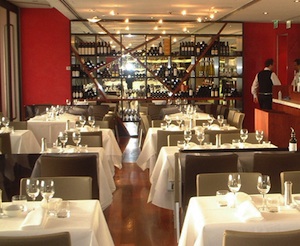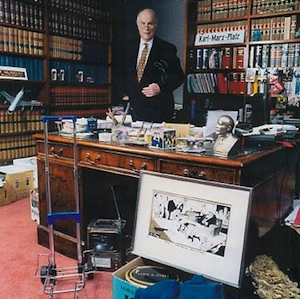Defamatorium ... Gacic v Fairfax ... Restaurant review ... Right to comment depends on getting the facts right ... Too much Coco, not enough Roco ... Despite the NSW Court of Appeal's finding, Artemus Jones thinks restaurant reviewing is safe, provided all the other ingredients are well served
 The Court of Appeal's recent judgment in Gacic v John Fairfax has brought on much gnashing of teeth among defamation lawyers who act for large media organisations.
The Court of Appeal's recent judgment in Gacic v John Fairfax has brought on much gnashing of teeth among defamation lawyers who act for large media organisations.
Cries of "it is the end of the defence of fair comment" and "Fairfax would have succeeded in England" have been heard along Phillip Street and Martin Place.
In my opinion this is bunkum.
Justice Rares of the Federal Court pointed out some years ago that the defence of comment had been narrowly interpreted by the NSW Court of Appeal in a number of judgments, going back to the 1990s.
In Channel 7 Adelaide v Manock the High Court fell in with this trend.
Justice Ruth McColl judgment in Gacic (with whom Giles and Sackville agreed) changes nothing in respect of the operation of the defence of comment.
 McColl: scathing about trial judgeNotwithstanding the tendency of courts to confine the ambit of the defence, it can still offer wide-ranging protection for professionally written articles - provided that the author holds the stated opinions and the supporting facts are truly stated.
McColl: scathing about trial judgeNotwithstanding the tendency of courts to confine the ambit of the defence, it can still offer wide-ranging protection for professionally written articles - provided that the author holds the stated opinions and the supporting facts are truly stated.
In my view Matthew Evans' restaurant review in The Sydney Morning Herald - the matter complained of in Gacic - was imprecise.
Evans' review was published on September 30, 2003. The review:
- Is seriously defamatory.
- Refers to "Coco Roco" compendiously as one entity.
- Notwithstanding (b) states explicitly that there were two quite separate restaurants: Coco and Roco.
Added to this are two further facts not in dispute:
- Evans ate only at Coco. He did not eat at Roco.
- Evans did not hold any adverse opinions about Roco.
Immediately after publication of the review the plaintiffs (the owners of both restaurants) sought an apology, but Fairfax refused to publish one. The plaintiffs then sued for defamation.
Enter Clive Evatt, who skillfully pleaded the following imputations:
- The plaintiffs sell unpalatable food at Coco Roco.
- The plaintiffs provide some bad service at Coco Roco.
- The plaintiffs are incompetent as restaurant owners because they employ a chef at Coco Roco who makes poor quality food.
Each imputation pointedly incorporates the compendious term "Coco Roco". Each imputation, therefore, defames both restaurants.
 Evatt: shrewdEvatt convinced a section 7A jury, the Court of Appeal and the High Court that each of these imputations arose and was defamatory of the plaintiffs. It was these imputations, therefore, which Fairfax had to defend.
Evatt: shrewdEvatt convinced a section 7A jury, the Court of Appeal and the High Court that each of these imputations arose and was defamatory of the plaintiffs. It was these imputations, therefore, which Fairfax had to defend.
At the defences trial before Justice Ian Harrison - fresh from a Court of Appeal birching in another defamation case: Bennette v Cohen - Fairfax ran an ingenious argument.
Accepting that they could not defend Evatt's imputations because they referred to both restaurants, Fairfax argued that there was in fact only one restaurant.
Harrison J agreed to decide this issue as a "preliminary point", which would determine the outcome of the defences of comment and truth.
Fairfax's argument had difficulties:
(a) The so-called preliminary point is irrelevant to the issues that Harrison had to determine. In the words of Giles JA it was "a false issue".
(b) The argument constitutes an attempt to radically re-define the meaning of imputations already found to have arisen.
(c) Fairfax's basic assertion is directly inconsistent with the unambiguous statement in the review that there were two restaurants. It is also untrue.
Harrison: found there was one restaurantJustice Harrison found for Fairfax on the "preliminary point" and upheld the defence of comment, (and truth as to some of the imputations).
Not so surprisingly, in a well-reasoned judgment, McColl JA found that Harrison had got it completely wrong.
Her Honour is scathingly critical of Harrison, but her judgment simply applies the relevant principles relating to the defence of comment to the facts of this case.
As a matter of law, McColl's decision is correct.
As a matter of basic fairness, the judgment is also correct. Why couldn't Fairfax confine the defamatory comments to Coco – the restaurant at which Evans had eaten?
Why did the review go on to defame Roco - a quite separate restaurant at which Evans had not eaten?
If the defamatory comment had been confined to Coco, then the defence of comment would have succeeded.
At the section 7A trial Clive Evatt created a fictional category of "business defamation" and persuaded the Court of Appeal of its validity. Fairfax appealed to the High Court, but it did not appeal on this issue.
Subsequently, in another case, the High Court put Evatt's heresy to rest.
 Matthew Evans: didn't enjoy his meal at CocoIn the High Court, Guy Reynolds and Evatt succeeded on the issue of the power of the Court of Appeal to direct verdicts in defamation appeals.
Matthew Evans: didn't enjoy his meal at CocoIn the High Court, Guy Reynolds and Evatt succeeded on the issue of the power of the Court of Appeal to direct verdicts in defamation appeals.
Now the defence of comment has failed squarely on the merits.
Actually, it is even worse than that.
Assume that Fairfax's assertion that there was only one restaurant is correct.
It follows that the assertion in the review that there were two restaurants must be false. In such circumstances, how could the defence of comment succeed?
Fairfax now faces a re-trial on damages as McColl JA held that Harrison J's provisional award of $80,000 was far too little.
In my opinion, this sorry saga gives rise to the following salutary lessons:
(a) Sloppy reviewing or editing will not (and should not) attract the protection of the defence of comment.
(b) Some large media organisations will spend a fortune (the legal costs in Gacic must now exceed $2,000,000) defending the indefensible.
(c) Clive Evatt is one of the shrewdest legal minds at the Sydney defamation bar.
I understand that Fairfax intends to seek special leave to appeal to the High Court. I would have thought that their chances would be slim. After all, what interest does the High Court have in determining whether Coco Roco was one restaurant or two in 2003?
I did, however, seek the view of a respected defamation lawyer in Sydney. His response was as follows:
"Artemus, to paraphrase the late great wordsmith Rex Mossop, 'If Fairfax get leave in this matter you can f*#k me in Pitt Street'."
On that note I'm off to dinner. And no matter how gruesome the fare I will resist the urge to publish a review.
Artemus Jones reporting
Dieppe